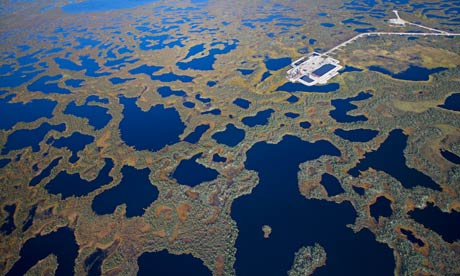From: The Guardian
Andrew Logan and Ryan Salmon
Monday 7 April 2014 13.00 EDT
Exxon Mobil has reported that none of its oil reserves will be stranded
now or in the future and claims a low carbon scenario is 'highly
unlikely'. But what if it's wrong?

An oil drilling
platform on the Siberian tundra. Globally, there are three times more
fossil fuel reserves than can be burned if the world is to avoid
potentially catastrophic global warming. Photograph: Gerd Ludwig/Corbis
When an international group of 77 institutional investors with more than $3tn in assets asked the world's 45 largest fossil fuel companies to assess the risks that climate change poses to their business, they were aware they were asking a tough, complex question.
Knowing this, investors launched the Carbon Asset Risk Initiative
to spur fossil fuel companies to assess the risks climate change poses
to their business based on two scenarios: a business-as-usual scenario
under which the world's fossil fuel use continues to grow, warming the
earth to levels society may not be able to adapt to; and a low-carbon
scenario where governments achieve their stated goal of limiting the
average temperature rise to below 2C.
Many of the 45 companies
that received this request are responding – among those, Exxon Mobil,
the world's largest publicly traded energy company, which agreed to publish a report after investors agreed to withdraw a pair of related shareholder resolutions.
No comments:
Post a Comment